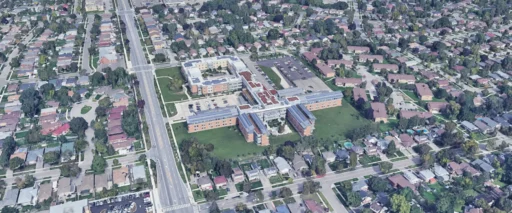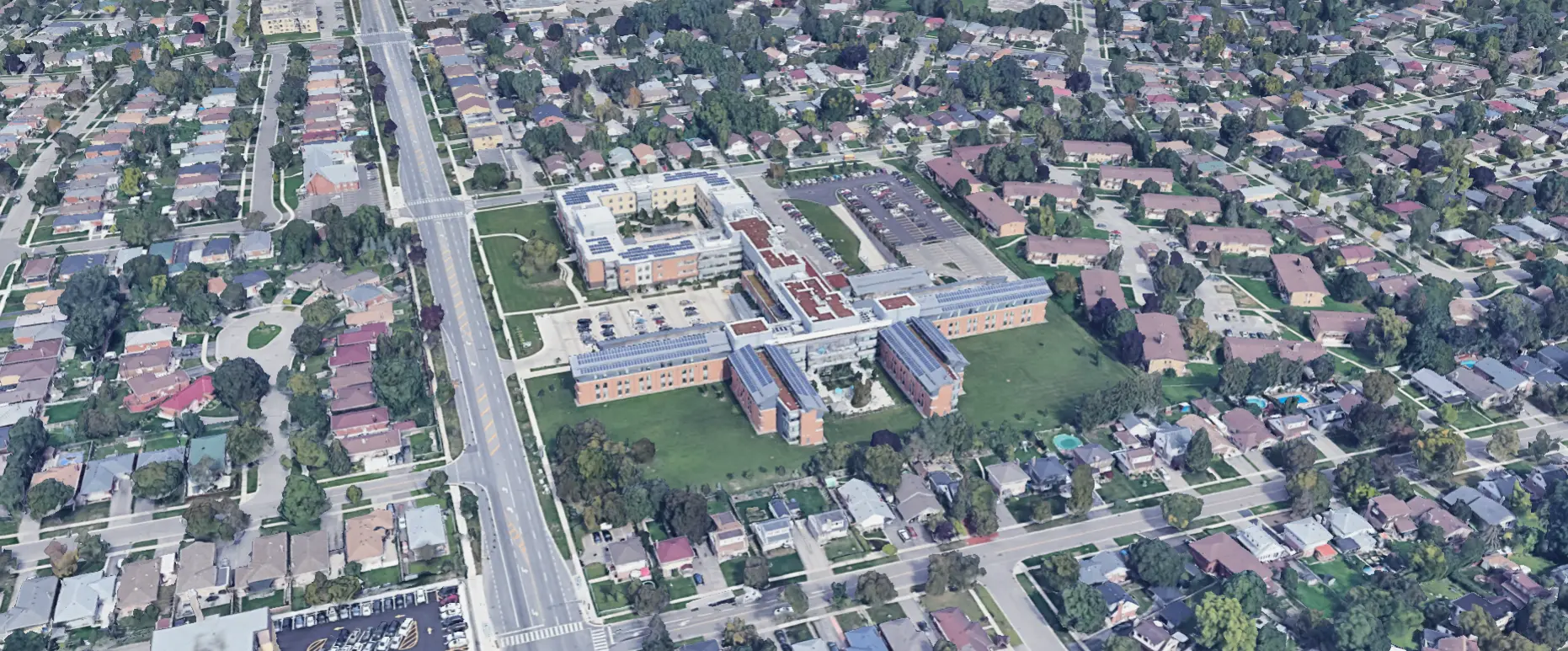Kipling Acres (2233 Kipling Avenue, Etobicoke) is owned and operated by the City of Toronto. There are approximately 340 beds.
Kipling Acres, established in 1959, is situated on a 20-acre site. It provides long-term care services, including for individuals with Alzheimer’s disease, and short-term care, such as rehabilitation post-surgery. Additionally, the facility offers Adult Day Programs and short-term Respite Care to support individuals temporarily when their primary caregivers are unavailable.
Inspection Reports for Kipling Acres
Our research team carefully reviewed and summarized inspection reports for Kipling Acres. You can read the original copies of the reports in the Government of Ontario website.
October 2023
The inspection conducted on September 29, October 3-5, and 10, 2023, including an offsite inspection on October 6, 2023, revealed several non-compliance issues.
- Plan of Care: The facility failed to update a resident’s care plan post-hospitalization for a fall. Although a fall prevention care plan was revised, it lacked active goals or interventions. Staff inconsistencies in understanding the fall prevention interventions for the resident were noted, increasing their risk of injury due to the absence of documented care instructions.
- Integration of Assessments, Plan of Care: There was a failure in staff collaboration for a resident experiencing a change in ambulation ability and pain. Despite documentation for a necessary physician assessment due to the resident’s condition change, there was no evidence of such an assessment taking place, potentially delaying appropriate treatment.
- Skin and Wound Care: The facility did not conduct essential assessments for a resident with altered skin integrity. The Braden Scale, a tool for evaluating skin and wound risks, was not completed as required. Additionally, there was a missing weekly skin assessment, which is crucial for timely and appropriate interventions for skin and wound management.
These findings indicate lapses in documentation, assessment processes, and collaborative care at the facility, impacting the quality of care and potentially leading to delayed or inappropriate interventions for residents.
September 2023
The inspection, conducted from August 17 to 28, 2023, with an offsite inspection on October 6, 2023, revealed several non-compliance issues.
- Plan of Care: The facility failed to revise a resident’s care plan following a medical doctor’s recommendation. Although the resident’s care was adjusted to be up in a chair every other day instead of daily, the written plan of care was not updated to reflect this change. Despite the lack of revision, staff followed the doctor’s recommendation, and no risk to the resident was identified.
- Skin and Wound Care: There was a failure to perform an initial skin and wound assessment for a resident exhibiting altered skin integrity. Despite treatment by a doctor and an order in the electronic Treatment Administration Record, the required assessment was not completed. This oversight could hinder the effectiveness of wound treatment and potentially compromise care based on the resident’s current needs.
- Skin and Wound Care: The facility did not reassess a resident’s altered skin integrity weekly as required. The first assessment was conducted four weeks after the initial treatment. The lack of timely assessments could lead to missed changes in skin condition and delay necessary adjustments in care.
These findings indicate lapses in maintaining and updating resident care plans and in conducting timely skin assessments, potentially affecting the quality of resident care.
June 2023
The inspection, conducted between May 30 and June 9, 2023, identified several areas of non-compliance.
- Plan of Care: Staff failed to collaborate effectively in assessing a resident, resulting in a lack of integrated and consistent assessments. Specifically, a resident’s readmission from the hospital with skin impairments wasn’t fully communicated to the Registered Dietitian, leading to a delay in nutritional intervention.
- Directives by Minister: A Food Service Worker was observed violating COVID-19 mask protocols in a dining room, posing a risk of infection transmission.
- Skin and Wound Care: Initial and weekly skin and wound assessments were not completed as required for a resident with altered skin integrity, potentially hindering treatment effectiveness and timely identification of changes in skin condition.
- Food Production: A Food Service Worker was seen using the same gloves for handling dirty and clean dishes without appropriate hygiene practices, increasing the risk of cross-contamination.
- Infection Prevention and Control Program: Staff failed to perform necessary hand hygiene when transitioning between tasks, particularly before handling food and clean dishes, raising the risk of infection.
- Dealing with Complaints: The facility did not include the Ministry’s toll-free number and patient ombudsman contact information in written responses to complaints, as required by regulations.
- Emergency Drug Supply: During a severe hypoglycemic episode, Glucagon was not administered to a resident as per policy, due to its unavailability on the unit, leading to the resident’s hospitalization.
- Residents’ Drug Regimes: In response to severe hypoglycemia, staff did not follow the prescribed treatment protocol, resulting in the worsening of the resident’s condition and subsequent hospitalization.
These findings indicate deficiencies in communication, adherence to health and safety protocols, and emergency response procedures, potentially impacting resident care and safety.
March 2023
The inspection, conducted from February 16 to February 28, 2023, revealed several non-compliance issues.
- Infection Prevention and Control: On February 16, 2023, expired Alcohol-Based Hand Rubs (ABHRs) were found in the worship room. Although the issue was immediately remedied, it indicated a lapse in meeting the “Infection Prevention and Control Standard for Long-Term Care Homes.”
- Plan of Care: A failure in staff collaboration was noted in the case of a resident-to-resident sexual abuse incident. Prior signs of inappropriate sexual behavior by a resident were not adequately communicated or managed, leading to an incident.
- Plan of Care: The staff provided a different level of assistance in bathing than what was specified in a resident’s care plan, posing a risk of injury.
- Duty to Protect: The home failed to protect a resident from sexual abuse by another resident, despite the victim’s inability to consent due to cognitive limitations.
- Transferring and Positioning Techniques: Unsafe transferring and positioning techniques were used, resulting in an injury to a resident during a transfer. The staff involved did not follow the home’s policy on safe application of transfer equipment.
These findings indicate significant concerns in areas such as staff communication, adherence to care plans, resident safety, and infection control practices.
November 2022
The inspection report, conducted in November 2022, highlighted several areas of non-compliance.
- Plan of Care: The facility failed to document specific interventions in a resident’s care plan, despite implementing them for managing responsive behaviors.
- Reporting and Complaints: The results of investigations into alleged resident neglect weren’t reported to the Director, indicating a lapse in following required protocols.
- Reporting Certain Matters to Director: Multiple incidents, including allegations of abuse and neglect, weren’t reported immediately to the Director as required.
- Care Plans and Plan of Care: The facility did not develop a 24-hour admission care plan for a resident as mandated, leading to a delay in continuity of care.
- General Requirements for Programs: Actions taken regarding a resident under a program, including assessments and interventions, were not documented as required.
- Responsive Behaviours: The facility failed to properly utilize the Dementia Observation System (DOS) monitoring tool for residents demonstrating responsive behaviors.
- Skin and Wound Care: The facility did not follow protocols for residents with altered skin integrity, including immediate treatment, interventions, and weekly reassessments, posing risks of delayed treatment and healing.
- Compliance Order: A Compliance Order was issued due to the use of inappropriate restraints on a resident, requiring the facility to review its restraint policy and re-educate staff.
These issues reflect concerns in care plan documentation, reporting procedures, program implementation, response to behavioral issues, and skin and wound care management.
March 2022
The inspection, conducted from March 14 to 17, 2022, by inspectors Samantha Perry and Stephanie Morrison, was a complaint-based inspection.
However, no non-compliances were issued as a result of this inspection.
August 2021
The inspection conducted by Iana Mologuina at Kipling Acres in Etobicoke on August 5-6, 9-12, 2021, was a Critical Incident System inspection. It focused on one unexpected death and three incidents related to falls.
- Plan of Care: There was a failure to ensure that the written plan of care for a resident included clear directions for staff and others providing direct care.
- Collaboration in Assessment: Staff failed to collaborate in assessing a resident, which should have integrated and complemented each other’s assessments.
- Infection Prevention and Control: Staff did not participate adequately in the IPAC program, especially concerning hand hygiene before and after meals.
- Falls Prevention and Management: After a resident’s fall, the necessary post-fall assessment was not completed as required by the home’s falls policy.
The inspection resulted in the issuance of 4 Written Notifications (WNs) and 3 Voluntary Plans of Correction (VPCs).
July 2021
The Critical Incident System inspection at Kipling Acres, conducted by Iana Mologuina on June 7-24, 2021, focused on several incidents including alleged improper treatment, an injury of unknown cause, alleged abuse, and six falls.
- Plan of Care: There was a failure to ensure the written plan of care for a resident included clear directions for staff, and the plan wasn’t regularly updated or followed, particularly in relation to falls interventions.
- Staff Collaboration: The staff did not effectively collaborate in assessing residents, leading to inconsistencies in care and lack of integrated assessments.
- Resident Reassessment and Care Revision: The facility failed to reassess residents and revise care plans when residents’ care needs changed.
- Safe Transferring Techniques: There was a failure to ensure that Personal Support Workers used safe transferring techniques when assisting a resident.
- Documentation of Care: Actions taken with respect to residents under care programs, including interventions and responses, were not adequately documented.
- Resident Clothing and Cleanliness: The facility failed to ensure a resident was dressed in clean and appropriate clothing.
Four Written Notifications (WNs) and two Voluntary Plans of Correction (VPCs) were issued for non-compliance.
December 2020
The Critical Incident System inspection at Kipling Acres, conducted by Derege Geda from November 3-13, 2020, focused on fall prevention and management.
- Plan of Care Compliance: The licensee failed to ensure that the care outlined in the plan of care was provided to the residents as specified. In one incident, a resident fell from their mobility device due to the Personal Support Worker not implementing the required intervention. The Director of Care emphasized the importance of adhering to the plan of care.
- Reassessment and Revision of Plan of Care: For two residents (resident #001 and resident #002), the facility did not effectively reassess and revise their plans of care after multiple fall incidents. The plans of care were not updated or evaluated for effectiveness, and new interventions were not implemented promptly. This failure was noted despite the residents’ health conditions making them prone to falls.
The inspector requested the licensee prepare a Voluntary Plan of Correction to ensure that care specified in the plan of care is provided as outlined, and when a resident is reassessed, different approaches are considered in the revision of the plan of care.

